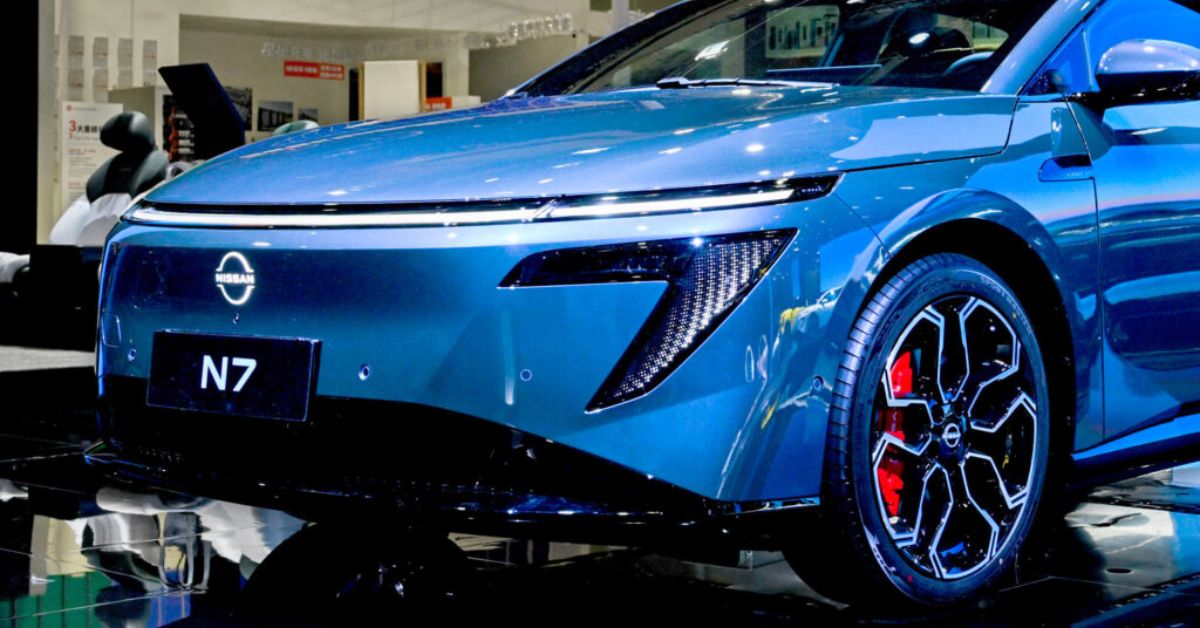In a market flooded with electric vehicle (EV) contenders, Nissan has pulled off something remarkable in China: it’s not just surviving—it’s thriving. While other legacy automakers struggle to find their footing, Nissan’s low-cost electric sedan, the N7, is rewriting the rules of engagement. And the implications stretch far beyond China’s borders.
🧨 The N7 Explosion: Affordable, Appealing, and Adapted
Launched in April 2025, the Nissan N7—developed through its joint venture with Dongfeng—has become a breakout hit. Priced at just 119,900 yuan (~$16,800), the N7 secured over 17,000 orders in its first month and delivered more than 10,000 units in August alone2. That’s not just impressive—it’s disruptive.
What makes the N7 so appealing?
- Price Point: At under $17,000, it’s one of the most affordable EVs in China, undercutting rivals like Honda’s S7 and P7, which launched at nearly double the price.
- Range & Specs: With up to 395 miles (635 km) of range, two battery options (58 kWh and 73 kWh), and a sleek, tech-forward design, it punches well above its weight.
- Local Flavor: The N7 isn’t a global model shoehorned into China—it’s tailored for Chinese consumers, with features like a built-in mini fridge, intelligent parking, and high-speed navigation support.
🧠 Localized Innovation: Nissan’s Strategic Pivot
Nissan’s success didn’t happen by accident. It’s the result of a strategic overhaul aimed at winning in China’s hyper-competitive EV market.
- $1.37 Billion Investment: Nissan committed over 10 billion yuan to revamp its China operations, including expanding its technical center and empowering local R&D teams.
- Faster Development Cycles: The N7 went from concept to production in just 12 months—a timeline previously unheard of for Nissan.
- Tech Partnerships: Collaborations with Chinese firms like Momenta and Huawei have supercharged Nissan’s driver-assistance and AI capabilities.
This shift marks a departure from the traditional top-down approach, where Tokyo dictated product decisions. Now, Chinese engineers are steering the ship, designing vehicles that resonate with local tastes and expectations.
🏁 Why It Matters Globally
China isn’t just the world’s largest EV market—it’s the proving ground for the future of mobility. What works in China today often sets the tone for global trends tomorrow.
Here’s why Nissan’s success matters:
1. Legacy Automakers Must Adapt or Die
Honda’s stumble in China is a cautionary tale. Despite launching EVs like the S7 and P7, Honda sold just 2,900 units in Q2 2025. Price missteps, lackluster tech, and a failure to localize doomed their efforts. Nissan’s contrasting success shows that legacy brands must evolve or risk irrelevance.
2. EV Affordability Is the Next Frontier
The N7 proves that EVs don’t need to be luxury items. With solid range, smart features, and a sub-$20K price tag, Nissan is democratizing electric mobility. As global markets grapple with affordability, the N7 could become a blueprint for cost-effective EVs worldwide.
3. China’s Influence Is Growing
China’s domestic automakers—BYD, NIO, XPeng—have already reshaped the EV landscape. Now, foreign brands like Nissan are learning that to compete, they must play by China’s rules. That means faster innovation, deeper localization, and tech partnerships that would’ve been unthinkable a decade ago.
🔮 What’s Next?
Nissan isn’t stopping with the N7. Its roadmap includes expanding its EV lineup from eight to ten models by 2027, many of which will be designed in China for both domestic and global markets. If the N7’s success is any indication, Nissan could be on the cusp of a renaissance—not just in China, but globally.
And as EV adoption accelerates worldwide, the lessons from China will become increasingly relevant. Affordability, agility, and local relevance aren’t just buzzwords—they’re survival strategies.
🏁 Final Thoughts
Nissan’s N7 is more than a car—it’s a symbol of transformation. It shows that legacy automakers can thrive in the EV era if they’re willing to rethink everything: from pricing and design to development and decision-making. In doing so, Nissan hasn’t just cracked the code in China—it may have written the next chapter in global EV history.
